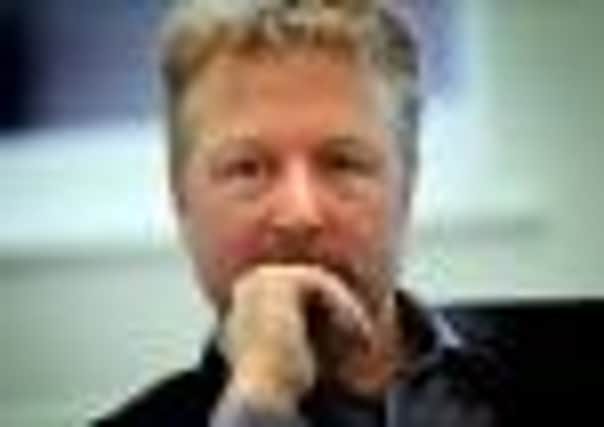Video: Face to face with Mr Facebook


Lord Richard Allan told the Yorkshire Post that social media services are “tools” that enable human rights such as a person’s economic, social, political and educational development. Social media helped people in North Africa achieve political change in the Arab Spring wave of revolutions, he said.
Facebook’s director of policy in Europe, Middle East and Africa was the main speaker at Friday’s Yorkshire Post Business Club event, held as part of the Leeds Digital Festival. He told the audience: “I was in London during the riots and I spent the evening sitting there checking in with all my family and friends about who was where and who was safe and what was going on. And that’s how people use social media in times of crisis.
Advertisement
Hide AdAdvertisement
Hide Ad“Ninety eight per cent of people are sitting there using it in an entirely socially beneficial way to keep tabs on what’s going on, the police are using it to get messages out and there’s a tiny, tiny minority who may be using it to organise bad things. So to turn something off that’s producing huge social value and helping out these millions of people in the UK in order to get at that tiny minority when there are other ways at getting at that tiny minority would be a very poor public policy decision, I believe.”


MPs threatened a clampdown on social media following the summer riots with some lawmakers suggesting that sites should be temporarily suspended in times of civil unrest to stop trouble being organised online.
Facebook is among a number of websites censored by the Chinese authorities. Lord Allan spoke about the “challenge” people in China may face when trying to use Facebook, blaming local service providers for blocking the site.
Asked if access to social media is a human right, Lord Allan said: “I think what social media internet services do is they enable a whole range of other human rights. Your right to your economic development, your social development, your educational development, your political development. All of those rights are delivered by having good access to the internet.”
Advertisement
Hide AdAdvertisement
Hide AdThe former Liberal Democrat MP for Sheffield Hallam was speaking at Shine Business Centre in Harehills, Leeds.
Facebook, founded in 2004, now has more than 800m users who log on at least once a month. Of that number, over half of them come back every day, said Lord Allan. In Leeds, he said 361,000 people use the Facebook service.
The company employs around 2,500 people globally, with 80 of those staff members based in the UK. In comparison, Google employs just over 31,000 people globally and around 1,000 people in the UK.
After giving an address, Lord Allan was joined by Jonathan Healey, development director at Netconstruct, Gary Lockton, development director at Fuse8, and David Eccles, managing director at Numiko, for a panel debate.
Advertisement
Hide AdAdvertisement
Hide AdLord Allan said corporates should give their employees “clear guidelines” on using social media as part of branded communications, and otherwise, companies should “ignore” chatter by their employees online in the same way they wouldn’t eavesdrop on them in the pub.
He spoke of two key professional uses of social media. Firstly, Lord Allan highlighted the ability to drill down from a geographical location through a demographic through a range of interests to focus on a particular group of people for marketing purposes. Secondly, he spoke of “social discovery”, where an idea is put into the user’s head, for example by one of their “friends” on Facebook who might have “liked” an advert, sharing it with their social circle. But Mr Healey said: “The key thing is you have to go where the fish are biting and for many sectors the fish might not be biting in a social aspect. You’ve got to decide that for who you are and where you are.
“I think one thing that Google demonstrated when they introduced their pay-per-click was that suddenly you could guarantee a return on your investment from advertising. Now what social does which goes one step further I think is that it not only guarantees what return you’re getting but it also guarantees the target demographic that you are reaching which you could never do before and that’s possibly the most exciting thing that’s happened in advertising.”
“Understanding your audience and understanding how they use the web is critical”, said Mr Eccles, adding: “What things like pay-per-click and Facebook advertising let you do is try things really quickly, turn them off, turn them on, and see what works.”
Advertisement
Hide AdAdvertisement
Hide AdLord Allan stressed the importance placed on security at Facebook, explaining that it is updated week in week out to meet identified risks. Mr Lockton raised concerns about “the amount of data being captured that you don’t know about”. He said: “Your every action online is being recorded, in theory anonymously, but that worries me a lot more as an individual than something like Facebook where actually you’ve almost said this is okay to share, it’s the stuff I haven’t agreed I’m going to share that worries me more.”
The Yorkshire Post Business Club aims to provide a networking forum for business leaders. It is supported by Aviva, DLA Piper, Goldman Sachs, PwC and Yorkshire Bank, the main sponsors of the Yorkshire Post Excellence in Business Awards.